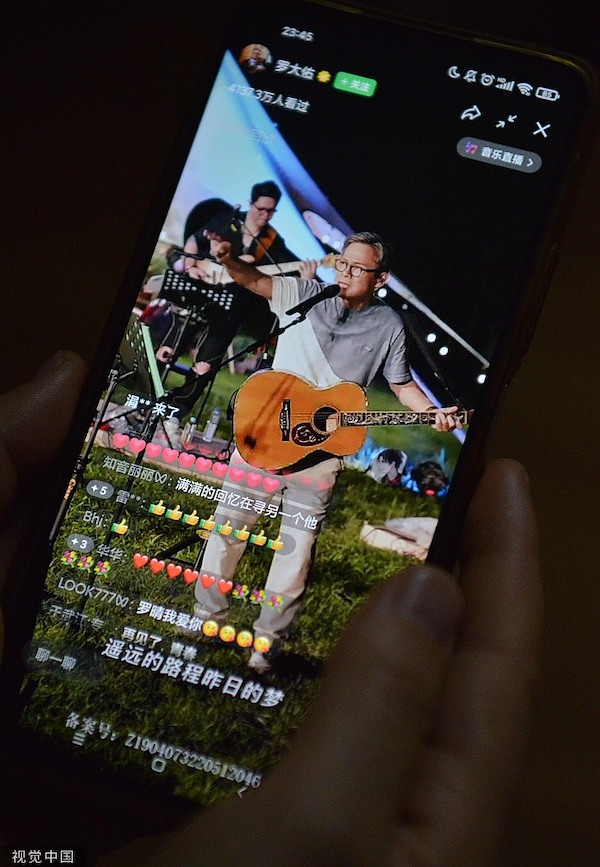
- Home
- Media Center
-
Events
- Wuzhen Summit
- Regional Forums
- Practice Cases of Jointly Building a Community with a Shared Future in Cyberspace
- World Internet Conference Awards for Pioneering Science and Technology
- The Light of Internet Expo
- Straight to Wuzhen Competition
- Global Youth Leadership Program
- WIC Distinguished Contribution Award
- Membership
- Research & Cooperation
- Digital Academy
-
Reports
- Collection of cases on Jointly Building a Community with a Shared Future in Cyberspace
- Collection of Shortlisted Achievements of World Internet Conference Awards for Pioneering Science and Technology
- Reports on Artificial Intelligence
- Reports on Cross—Border E—Commerce
- Reports on Data
- Outcomes of Think Tank Cooperation Program
- Series on Sovereignty in Cyberspace Theory and Practice
- Other Achievements
- About WIC
- 中文 | EN

WeChat app puts life into non-live gigs

Mandopop icon Lo Ta-yu gave an online live show on May 27, 2022. [Photo/VCG]
Quarantining, shutdowns have made livestreaming into the new normal
While using livestreaming to peddle merchandise is old hat in China's internet lexicon, livestreamed concerts are becoming the new talk of the town.
This is evidenced by the latest social media buzz regarding two live shows hosted by livestreaming platforms this past weekend from Singaporean diva Stefanie Sun and Mandopop icon Lo Ta-yu.
As the COVID-19 pandemic effectively put live performances in peril, quarantines and social distancing have unexpectedly incited an explosion in livestreamed concerts and DJ sets.
And since the degree of discussion represents traffic, internet platforms are elbowing their way into the conversation to find plausible monetization pathways.
Albeit a latecomer to the short video sector, WeChat Channels-the proprietary on-the-go video arm of WeChat-is a pioneer of sorts in bringing live music shows to people's screens, large or small.
The practice went viral in December, when Irish boyband Westlife livestreamed their inaugural virtual concert on WeChat Channels, drawing over 27 million viewers and generating over 160 million likes in just three days.
Then the online concert crowd simply grew bigger and stronger, with zealous Chinese fans cheering for rapper Jay Chou and boyband Mayday. In April, Tencent Music Lab even released a 4K video via the Channels of Canto-pop legend Leslie Cheung's 2000 concert series-digitally enhanced using artificial intelligence.
The literal cosmic scale of livestreaming marks Tencent's ambitions for Channels, which has been an overlooked player in the white-hot short video rivalry dominated by Douyin and Kuaishou.
In an annual Open Class mainly aimed at WeChat developers in January, the company announced an ambitious plan to double down on the two-year-old Channels through a suite of synergies within the all-in-one super app.
According to Zhang Xiaochao, a WeChat representative who spoke during the event, Channels will also launch paid livestreaming sessions, and invest in a 5 billion targeted views "cold start" traffic package to help new content makers build their profiles and achieve steady growth. They will also launch knowledge-based columns covering multiple subjects.
Efforts like these are beginning to reap early gains. Livestreaming revenue derived from Channels helped boost January-March social media-related income 1 percent year-on-year to 29.1 billion yuan ($4.37 billion), according to Tencent's earnings statement.
A report by CITIC Securities estimated that daily active users of the two-year-old Channels have soared to 500 million, quickly putting it between Douyin and Kuaishou, and the service is on course to reach 780 million, a benchmark level registered by its popular social sharing function Moments.
A separate research note by Sinolink Securities also anticipates a gradual rise in gross margin, as revenue sources expand and stabilize.
Livestreamed concerts are a complete game-changer in the live performance industry, said Coolio Yang, a social media research veteran and marketing solutions expert.
"In previous times, concert revenue was mainly about ticketing, and sponsorship from brands was mainly a 'nice to have'," said Yang, who has advised a torrent of multinational and domestic brands on marketing strategies in China and overseas.
"Under the new norm, all eyes are on brands and their interaction with internet platforms. The choice of sponsorship thus largely depends on their judgment of the potential topicality of an event, or the emotional nostalgia a concert is predicted to elicit," he said.
Based on the experience of operating his Douyin account, Yang foresaw that short video platforms were likely to turn this booming tide into an independent stream of value-added services by introducing a fee-based model.
"For instance, internet companies could explore charging a monthly fee to subscribe to a routine entertainment program and pay extra for special bells and whistles," Yang said.
"The advantage of Channels lies in the rich resource pool from Tencent's entertainment arm, from music to movies. By leveraging Channels as a 'lighter' entrance point, they may even better reinvigorate these resources."

The World Internet Conference (WIC) was established as an international organization on July 12, 2022, headquartered in Beijing, China. It was jointly initiated by Global System for Mobile Communication Association (GSMA), National Computer Network Emergency Response Technical Team/Coordination Center of China (CNCERT), China Internet Network Information Center (CNNIC), Alibaba Group, Tencent, and Zhijiang Lab.





